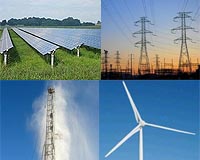 |
Exeter, UK (SPX) Nov 22, 2010 Global carbon dioxide (CO2) emissions - the main contributor to global warming - show no sign of abating and may reach record levels in 2010, according to a study led by the University of Exeter (UK). The study, which also involved the University of East Anglia (UK) and other global institutions, is part of the annual carbon budget update by the Global Carbon Project. In a paper published in Nature Geoscience, the authors found that despite the major financial crisis that hit the world last year, global CO2 emissions from the burning of fossil fuel in 2009 were only 1.3 per cent below the record 2008 figures. This is less than half the drop predicted a year ago. The global financial crisis severely affected western economies, leading to large reductions in CO2 emissions. For example, UK emissions were 8.6% lower in 2009 than in 2008. Similar figures apply to USA, Japan, France, Germany, and most other industrialised nations. However, emerging economies had a strong economic performance despite the financial crisis, and recorded substantial increases in CO2 emissions (e.g. China +8 per cent, India +6.2 per cent). Professor Pierre Friedlingstein, lead author of the research, said: "The 2009 drop in CO2 emissions is less than half that anticipated a year ago. This is because the drop in world Gross Domestic Product (GDP) was less than anticipated and the carbon intensity of world GDP, which is the amount of CO2 released per unit of GDP, improved by only 0.7 per cent in 2009 - well below its long-term average of 1.7% per year." The poor improvements in carbon intensity were caused by an increased share of fossil-fuel CO2 emissions produced by emerging economies with a relatively high carbon intensity, and an increasing reliance on coal. The study projects that if economic growth proceeds as expected, global fossil fuel emissions will increase by more than 3% in 2010, approaching the high emissions growth rates observed through 2000 to 2008. The study also found that global CO2 emissions from deforestation have decreased by over 25% since 2000 compared to the 1990s, mainly because of reduced CO2 emissions from tropical deforestation. "For the first time, forest expansion in temperate latitudes has overcompensated deforestation emissions and caused a small net sink of CO2 outside the tropics", says Professor Corinne Le Quere, from the University of East Anglia and the British Antarctic Survey, and author of the study. "We could be seeing the first signs of net CO2 sequestration in the forest sector outside the tropics", she adds. The Global Carbon Project was formed to assist the international science community to establish a common, mutually agreed knowledge base supporting policy debate and action to slow the rate of increase of greenhouse gases in the atmosphere. The project is working towards this through a shared partnership between the International Geosphere-Biosphere Programme (IGBP), the International Human Dimensions Programme on Global Environmental Change (IHDP), the World Climate Research Programme (WCRP) and Diversitas. This partnership constitutes the Earth Systems Science Partnership (ESSP).
Share This Article With Planet Earth
Related Links University of Exeter Global Carbon Project
 CO2-Free Energy Can Meet Global Energy Needs In 2050
CO2-Free Energy Can Meet Global Energy Needs In 2050Copenhagen, Denmark (SPX) Nov 22, 2010 Riso Energy Report 9 lists a wide range of energy technologies in the market with low or no emissions of greenhouse gases, describing how several of these will be made commercially available in the next decades. However, it is not possible to make the world's energy supply CO2-free as cheaply as possible, using only technology development in the current energy systems. There must be ... read more |
|
| The content herein, unless otherwise known to be public domain, are Copyright 1995-2010 - SpaceDaily. AFP and UPI Wire Stories are copyright Agence France-Presse and United Press International. ESA Portal Reports are copyright European Space Agency. All NASA sourced material is public domain. Additional copyrights may apply in whole or part to other bona fide parties. Advertising does not imply endorsement,agreement or approval of any opinions, statements or information provided by SpaceDaily on any Web page published or hosted by SpaceDaily. Privacy Statement |